UK going in 'wrong direction' on flooding, experts say
- Published
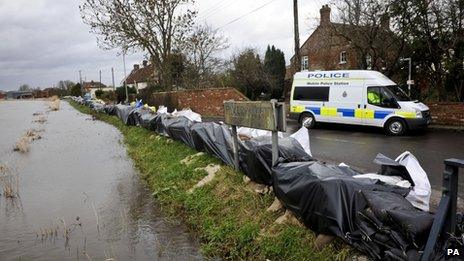
The UK needs to spend an extra £500m on flood prevention, experts said
The government has been criticised by its own advisers for failing to prevent developments that contribute to flooding.
The Committee on Climate Change told BBC News that just as scientists are predicting more extreme weather, buildings are still being allowed on flood plains, gardens are still being paved over and urban green space is being lost.
The committee said an extra £500m was needed to stop flooding getting even worse.
The government said a record amount was already being spent on flood defences.
Members of the committee, the government's official advisory body, have been exasperated by the row over dredging in the Somerset Levels.
'Wrong direction'
They say the floods debate is far too narrow, and insist the whole water system in the UK needs to be re-engineered to catch water on the uplands and prevent flooding downstream.
The committee's specialist on adapting to climate change, Daniel Johns, said: "Flood damages are expected to increase across the UK. Scientists are becoming bolder in attributing recent weather events and flooding to the level of global warming already observed.
"But measures of our exposure to flooding are going in the wrong direction.
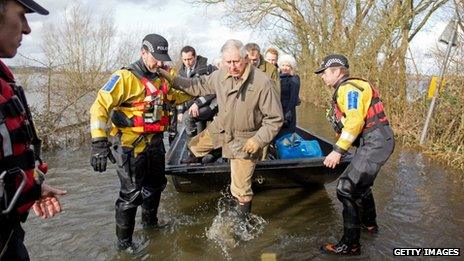
Prince Charles visited flood-affected areas of Somerset on Tuesday
"Development appears to be continuing in areas of significant flood risk despite planning controls. Urban green space is being lost and gardens are being paved over. Permeable paving options are available but their take-up appears very low.
"Every millimetre of rain deposits a litre of water on a square metre of land. A day of even modest rainfall can deposit several million litres of water on a town or city."
He called for the widespread adoption of so-called Sustainable Drainage Systems (SuDS), which capture water and slow the rate that it enters the drains.
If the £500m needed for flood risk management was not spent, increasing numbers of homes would be at "significant flood risk", Mr Johns said.
"As a result, we can expect avoidable flooding to take place in future years, causing as much as perhaps £3bn in damages," he said.
He said the £500m was needed over a four-year period.
Think differently
His comments were backed by Andrew Miller, chair of the Commons Science and Technology Committee.
Mr Miller said the government should reforest hillsides where soil had been compacted by sheep, and use "soft engineering" to capture rainfall in upstream areas.
"We have got to think differently about the way we do things," he told BBC News.
"Clearly it makes sense for us to do engineering work upstream if we can slow down the flow of water much more cheaply and effectively than by taking measures downstream. These issues are even more important given the prospect of climate change."
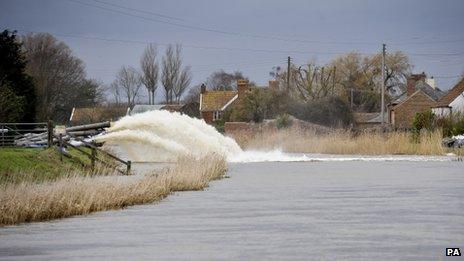
Millions of tonnes of water have been pumped off flooded land in Somerset
Mr Miller said it was time to re-focus the debate on flooding towards prevention rather than cure.
What is believed to be the UK's biggest preventive scheme is underway in Llanelli.
Welsh Water, a not-for-profit company, introduced it because the town's sewerage system repeatedly flooded homes and polluted the River Lliedi.
It involves digging up stretches of tarmac and paving to create catchment pits for storm water, diverting water into the pits from gutters and finally putting grass and plants on top of the pits.
Other ways
The water is held in the soil and slowly seeps away or evaporates. The ideas have been praised by the water regulator Ofwat.
Steve Wilson, a director of Welsh Water, told BBC News: "Llanelli suffers quite a lot of flooding. Traditionally we would build bigger pipes or tanks to catch the water but we're reaching the capacity of them too soon.
"So we are trying an approach that will be cheaper and more effective. We are taking water off the roofs and the streets, then instead of putting it down the highway drains we're finding other ways of putting it back into the environment and being slowed down."
He said some of the early parts of the scheme were catching more water than envisaged. He said the total project would take 22,500 cubic metres of water every year out of sewers, removing the risk of flooding from 57 properties.
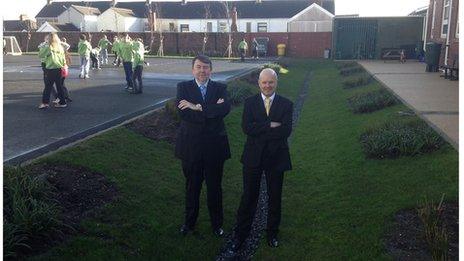
A "swale" is designed to collect water and reduce flooding elsewhere
Another local innovation is an ingeniously designed playground at the nearby Stebonheath Junior School, which includes a grassy hollow for trapping flood water - known as a swale.
Dylan Davies and Caitlin Thomas, both 11, said pupils had also helped design a rain-catching garden with a pond.
"The playground used to be all flooded. It's much better now," they said.
"When it rains, it runs off the roof and the playground into the swale which absorbs the water and pushes it gently into the drains. It doesn't flood any more."
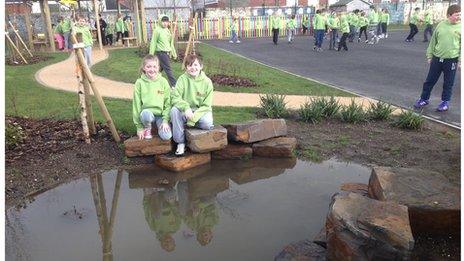
One school has created a "rain-catching pond" to ease flooding problems
Recent changes in planning law oblige all new developments to catch water from their own site and prevent it adding to floods, although the full implementation of the law has been delayed by what critics claim is disarray in government.
Other experimental schemes are attempting to hold water on upland sites by cramming gorse into streams from peat bogs, blocking young rivers with fallen trees and creating low-level earth dams to contain water so it soaks into the soil.
It will be a challenge to devise policies that incentivise farmers to re-forest upland areas to catch water and stop soil running off into streams. Some think farmers should be obliged to change the way they farm in order to obtain their grants from taxpayers.
Tackling the legacy of decades of flood-inducing buildings in towns and cities will be even more costly and challenging. Water engineers hope major supermarkets will demonstrate their claims over social responsibility by breaking up their car parks and installing porous surfaces to catch run-off.
Scheme like this were recommended in the Pitt report into the 2007 floods, external. They will come under renewed scrutiny as the government studies the lessons to be learned from this year's deluge.
Follow Roger on Twitter @rharrabin, external
- Published4 February 2014
- Published29 January 2014
- Published22 January 2014
- Published16 January 2014
- Published10 January 2014